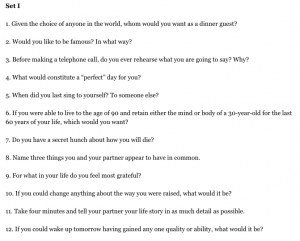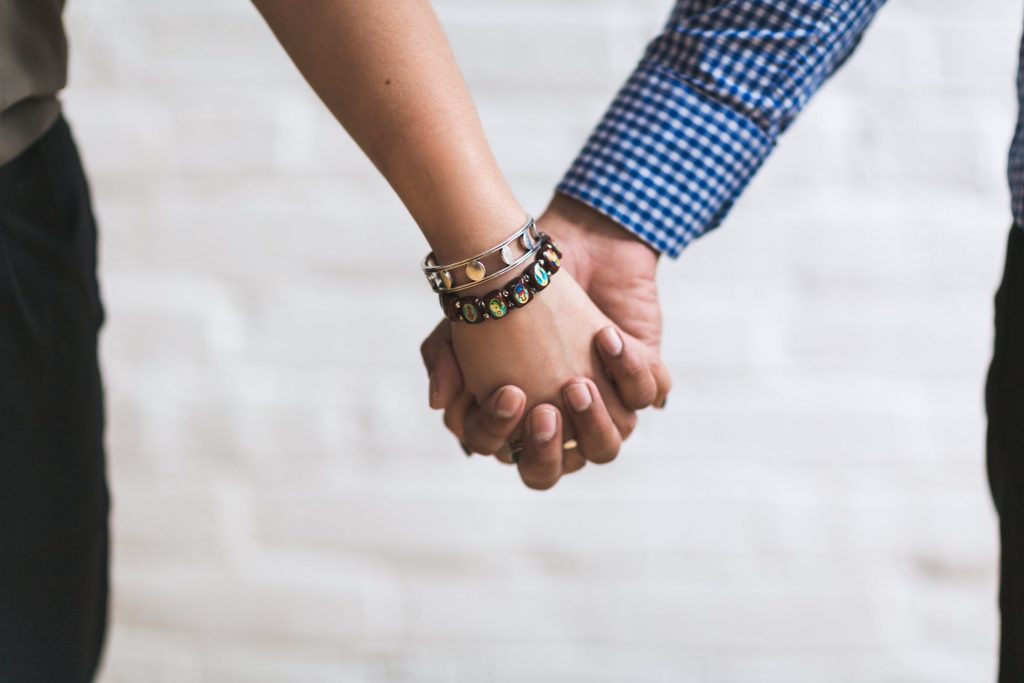Feb. 7, 2019
John Myers, a faculty member in the Department of Psychological Sciences, studies the evolutionary underpinnings of close relationships and social interaction. Most of his research focuses on how people’s behavior changes when they’re motivated to look for either a long-term or a short-term mate. He also has investigated how and why friendship might have evolved. He talked to NAU News about navigating relationship rapids leading into Valentine’s Day.
What tips do you have for couples celebrating Valentine’s Day?
According to Arthur Aron’s self-expansion model, when we form new relationships our self can, well, expand—that is, we begin to incorporate aspects of close others into our own identity. New relationship partners start to take on similar speech patterns, they start to see things from the perspective of their partner, and they come to enjoy activities that were introduced to them by their partner. In psychological terms, they begin to perceive self-other overlap, the feeling of not knowing where you end and your partner begins. We like to experience this self-expansion. In fact, according to this model, one of the primary motivations that underlie our decision to enter a new relationship is that we think a potential romantic partner may provide us with an opportunity for self-expansion. This is one reason relationships are so exciting early on: Both partners’ selves are expanding as they absorb aspects of the other into their own identity.
One way you might foster this sense of expansion is by doing things your partner likes to do or by doing something neither of you has done before, something you can share. Alas, as we all know, the exciting, passionate love we experience early in a relationship fades over time. According to the model, part of the reason this occurs is that the relationship isn’t providing us with opportunities for self-expansion anymore. If you’re starting to feel this way, research suggests that engaging in new, exciting (not just pleasant) activities with your partner can rekindle a relationship by providing new opportunities for both partners to expand their respective selves together. Go to the Snowbowl and try out snowboarding, sing a duet at a karaoke bar, check out the Flagstaff Climbing Center and give rock climbing a go, maybe take a road trip to Vegas and get a little crazy. All these things beat the hell out of a dinner at the Olive Garden. They’re certainly going to be better at building closeness between you and your partner.
How can people avoid depression related to Valentine’s Day? This can be for couples or people not in relationships.
Ah, the single on Valentine’s Day trope. First, if you’re in a relationship and depressed on Valentine’s Day, I’m sorry. That’s a bummer. See my tips for celebrating Valentine’s Day, I guess.
If you’re single on Valentine’s Day, that’s totally cool! Relax. Lots of people actually like being single more than they like being in relationships. Hell, I’m a relationships researcher, and I’m one of them! If you’re one of my people, rejoice! No awful mystery chocolates or high-pressure dates for you! Don’t let The Man tell you how to feel about being single.
If, however, you feel a little lonely and have a friend or roommate you’d like to build a closer relationship with, here’s a link to a list
What are good habits for couples to practice the rest of the year to keep their relationships healthy and happy?
A psychologist named John Gottman was able to predict divorces with 85-95 percent accuracy by observing four relationship-damaging behaviors. These are:
- Defensiveness, which occurs when you start to take your partner’s complaints personally and deny responsibility for any of your misdeeds
- Criticism, which occurs when you attack your partner’s personality or character rather than their behaviors when you get into an argument
- Stonewalling, which occurs when you withdraw or check out from an argument you’re having with your partner
- Contempt, which occurs when you actively show disrespect for your partner. (If this is where you’re at, your relationship is pretty much already over.)
According to Gottman, there is also this thing called a demand-withdrawal pattern, which occurs because women tend to be more likely to criticize and men tend to be more likely to stonewall. This demand-withdrawal pattern results in a cycle of increasing tension, with one partner becoming more and more critical and the other partner tuning their partner out more and more. These conditions make for the perfect storm.
If you want to avoid these pitfalls, be mindful of how you communicate with your partner. When you have a disagreement, focus on your partner’s behaviors, not their personality. Accept and own your faults, and apologize to your partner when you’ve done something insensitive.
Actively listen to your partner when they express dissatisfaction with something you’ve done. Respect your partner. This is all pretty basic stuff, but it goes a long way. Just don’t be a jerk.
Dating has shifted so much to apps and the Internet or hanging out instead of pairing up. What advice do you have for people navigating this new landscape?
Ugh… this is a question about Tinder, isn’t it? The bastard love child of Pornhub and eBay. Maybe I’m just an old man who is totally out of touch, but using these apps seems masochistic to me. I feel like apps like these lead people to view others as commodities and may even lead people to commodify themselves. I also worry about the people who aren’t making as many matches as they’d like to on these apps. I imagine this might be detrimental to people’s self-image. If you’re one of these people, don’t worry about it. I can’t think of a more superficial way to meet potential dates than by swiping right on Tinder profiles. People (yourself included) are much deeper and more interesting than a carefully selected profile pic and a mildly amusing self-description. If you like Tinder and use it all the time, that’s fine. I’m not judging. Just, consider taking a break from it for a while. Who knows, it might prove beneficial to your well-being.
How can people be their best selves both in and out of relationships?
Be honest with yourself. Know the state of your relationship. If you’re worried about the state of your relationship and want to work on it, get to work now. Don’t wait. Just remember that this will be a two-person job. If you’re unhappy in your relationship and have doubts that you ever will be happy, get out of it now. Don’t wait. You’re surrounded by interesting people right now. Find someone who can make you happy, somebody who can provide you with new opportunities for self-expansion.
If you’re single, don’t feel obligated to succumb to the pressure our culture puts on people to pair up with someone at all costs. There are some pretty substantial benefits associated with being single, not the least of these is that being single gives you a chance to learn about yourself, on your own terms. Also, being single gives you a chance to build strong friendships. Remember, friendships are just as important as romantic relationships. They also tend to be more permanent.



